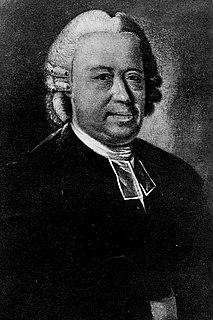Johann Jakob Schmauss (10 March 1690 - 8 April 1757) was a German jurist, historian, and university professor. [1]
Contents

Johann Jakob Schmauss (10 March 1690 - 8 April 1757) was a German jurist, historian, and university professor. [1]

Johann Jakob Schmauss was born in Landau. After attending school in Durlach and Stuttgart, he studied at the University of Strasbourg and the University of Halle, where he fell under the influence of Christian Thomasius and Nicolaus Hieronymus Gundling. He obtained his Habilitation in 1712, qualifying him to hold lectures in history. At this time Schmauss began regularly publishing journals. Without limiting his literary activities, in 1721 he joined the service of the Margrave of Baden-Durlach, first as a councilor. In 1722 he published Corpus juris publici Germanici academicum, the first clear guide to imperial public law; the study went through seven editions by 1794. [2] On 29 April 1734, Schmauss held the chair of Natural Law (historiarum et juris naturae et gentium) in Göttingen. After he accepted a call to return to Halle, where he held an equivalent post, and briefly taught at Leipzig, but in 1744, he returned again to his previous position at Göttingen, where he remained until his death.
Johann Heinrich Zedler was a bookseller and publisher. His most important achievement was the creation of a German encyclopedia, the Grosses Universal-Lexicon , the largest and most comprehensive German-language encyclopedia developed in the 18th century.

Johann Gottfried Eichhorn was a German Protestant theologian of the Enlightenment and an early orientalist. He was a member of the Göttingen School of History.

Christian Thomasius was a German jurist and philosopher.

Johann Adam Hiller was a German composer, conductor and writer on music, regarded as the creator of the Singspiel, an early form of German opera. In many of these operas he collaborated with the poet Christian Felix Weiße.
Gottfried Achenwall was a German philosopher, ARA historian, economist, jurist and statistician. He is counted among the inventors of statistics.

Irnerius, sometimes referred to as lucerna juris, was an Italian jurist, and founder of the School of Glossators and thus of the tradition of Medieval Roman Law.

Johann Gottlieb Heineccius was a German jurist from Eisenberg, Thuringia.
Hans Freyer was a conservative German sociologist and philosopher.

Johann Stephan Pütter was a German law lecturer and publicist. He was professor of law at the university of Göttingen from 1746 until his death. He exerted great influence on the law institutions of his time. His principal work is Historische Entwicklung der heutigen Staatsverfassung des Deutschen Reichs.

Johann Friedrich Gleditsch was a major book publisher in the late 17th and early 18th centuries.
Johann Gottlieb Siegel was a German legal scholar.

Moritz Georg Weidmann was a German bookseller and publisher based in Leipzig, accredited to the courts of Poland and the Electorate of Saxony. He was the son of the Moritz Georg Weidmann Senior. He entered the business in 1713 as a partner, and in 1717 took complete control of his father's bookstore, which his stepfather, Johann Ludwig Gleditsch, had managed for him since 1694.

Christian Wilhelm Franz Walch was a protestant German theologian and professor of theology from Göttingen. He authored numerous books.

Ahasverus Fritsch was a German jurist, poet and hymn writer of the Baroque era.
August Ludwig Schott (1751–1787) was a German lawyer and professor.
Anton Wilhelm Plaz was a German physician and botanist.
Johann Christoph Hoffbauer was a German philosopher, who published extensively on natural law, ethics and psychology.
Gottfried Mascov was a German jurist and university professor.
Carl Stange was a German Protestant theologian and philosopher. In his work, he mainly dealt with issues of ethics and the philosophy of religion.

Johann Siegmund Valentin Popowitsch was a Styrian philologist and natural scientist. His advocacy of a standardized Upper German paved the way for Austrian German as a variety of Standard German.
| This German law related biographical article is a stub. You can help Wikipedia by expanding it. |